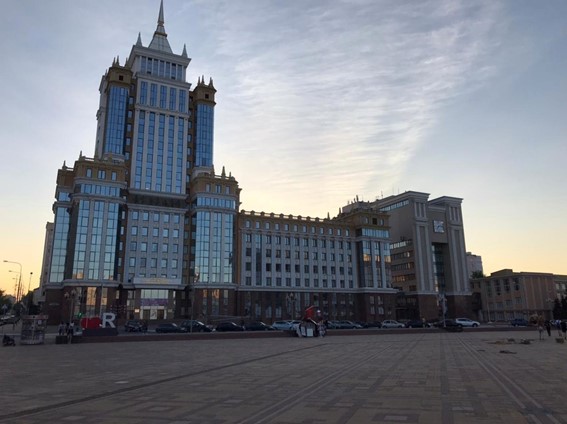Maria Helena Cruz Pistori. Pontifícia Universidade Católica de São Paulo (Pós-Doc). Associate Editor. Bakhtiniana. Revista de Estudos do Discurso. São Paulo, SP, Brazil.
Bruna Lopes Fernandes Dugnani. Universidade Federal Rural de Pernambuco. Executive Editor. Bakhtiniana. Revista de Estudos do Discurso.
 Nikolai Leonidovitch Vassiliev, recently deceased (1955-2021), is a well-known collaborator of Bakhtiniana since the publishing of the translation of his article on Bakhtin as a University Professor (13.2), in 2018. He was also a member of Bakhtiniana’s Advisory Board. In the current article – “Reader’s Notes on the Book by M. M. Bakhtin Problems of Dostoevsky’s Creation/Poetics” – once again, he shows us new aspects of Bakhtin’s work, namely its significance in the history of humanitarian science in the USSR (and worldwide).
Nikolai Leonidovitch Vassiliev, recently deceased (1955-2021), is a well-known collaborator of Bakhtiniana since the publishing of the translation of his article on Bakhtin as a University Professor (13.2), in 2018. He was also a member of Bakhtiniana’s Advisory Board. In the current article – “Reader’s Notes on the Book by M. M. Bakhtin Problems of Dostoevsky’s Creation/Poetics” – once again, he shows us new aspects of Bakhtin’s work, namely its significance in the history of humanitarian science in the USSR (and worldwide).
It has been 92 years since the first publishing of Problems of Dostoevsky Creation, in 1929. In 2019, this publication was remembered in a Colloquium – “90 Years of Problems of Dostoevsky Creation” – at the University of São Paulo, Brazil, where the eminent professor gave a conference on his reader’s notes on Bakhtin’s work. Afterwards, he wrote the article that presents his reflections on Bakhtin’s books on Dostoevsky (1929 and 1963 reformulation of the previous one).
The article deals with a series of important issues mainly related to Bakhtin’s book on Dostoevsky. Some of the items he comments on are the Marxism or Idealism implicit in Bakhtin’s texts; the religious issues in his work, the position this theme has in Dostoevsky’s books, and so on. It is an article that reveals deep research not only on Bakhtin’s work but also on the sources of his work.
In this paper, the author recalls how the first book was partly underestimated and unclaimed. He also analyzes some circumstances related to Bakhtin’s creation in the middle of the 20th century, when the Russian philosopher could not talk directly about some of the important questions Dostoevsky’s book deals with, due to political repression.
Although Vassiliev focuses on Dostoevsky’s book in his article, he also reflects on the main themes dealt in Bakhtin’s work, such as the influence of Structuralism, the carnivalization and the problem of laughter in Bakhtin’s interpretation of Dostoevsky’s novels. He also confronts “the code of Rabelais” to the “code of Dostoevsky,” pointing critically to a possible influence of the French author of the Russian classic.
There are many issues presented in the paper. Some of them answer questions that researchers worldwide have been wondering about, such as Mikhail Bakhtin’s career, production and ideas. According to Vassiliev, we can also draw a development of Bakhtinian thought from metaphysics to metalinguistics as well as from “Creation of Dostoevsky” – the 1929 book -, to the “Dostoevsky’s Poetics,” in 1963.
As the author states in his conclusions, Bakhtin’s thoughts are original and innovative, based on different scientific voices that echo along the “great time”:
“It is possible to discuss what is most important in science: the facts (positivism) or the original ideas and hypotheses (heuristics), although they are difficult to prove. In Bakhtin’s books on Dostoevsky, innovative thoughts are invigorated with: historical and literary non-trivial parallels, artistic facts, an unusual intellectuality, an erudition, a precise composition and a logical exposition, an academic stylistic, based on different scientific ‘voices’ (ancient, Christian, Western European, pre-revolutionary, Soviet). The scientist’s word about the writer remained in the Great Time, but the dialogue about Dostoevsky and the interpretations of his work continue…”
In fact, the dialogue proposed by Vassiliev with Bakhtin’s work enriches the conceptions the reader has about the Russian philosopher of language and his ideas. And we can also say that the article enables us to know an important Russian scholar who kindly shared his researches and the depth of his knowledge.
Finally, we must say that this entire issue of Bakhtiniana (16.2) offers the reader a large set of texts to be savored and included in everyone’s research. Recalling the Bakhtinian concept of a surplus of vision, we can say that the authors in this issue – all of them dealing with themes suggested by Bakhtin’s work – really have this excess of seeing toward the oeuvre of Mikhail Bakhtin (1990, p.22), whose importance is pointed by Cristóvão Tezza (2021) in his article “Bakhtin – a Personal Memoir”:
“At a time when it seems we are watching the progressive erasure of the literary sensibility, and seemingly incapable of reaching the subtleties of irony because it can only manage to hear its own voice, Mikhail Bakhtin remains an extraordinary and necessary counterpoint”.
References
BAKHTIN, M. Author and Hero in Aesthetic Activity (ca. 1920-1923). In: BAKHTIN, M. Art and Answerability. Early Philosophical Essays by M. M. Bakhtin. Translated by Vadim Liapunov. Austin: University of Texas Press, 1990.
TEZZA, C. Bakhtin – uma memória pessoal. Bakhtiniana: Revista de Estudos do Discurso [online]. 2021, vol. 16, no. 2, pp. 36-52 [viewed 31 August 2021]. https://doi.org/10.1590/2176-457348231. Available from: http://ref.scielo.org/4fqrrh
VASSILIEV, N. L. M. M. Bakhtin as a University Professor. Dialogic Pedagogy. An International Online Journal [online]. 2018, vol.06 [viewed 31 August 2021]. https://doi.org/10.5195/dpj.2018.234. Available from: http://dpj.pitt.edu/ojs/dpj1/article/view/234
VASSILIEV, N. L. M. M. Bakhtin como professor universitário. Bakhtiniana. Revista de Estudos do Discurso [online]. 2018, vol.13, no.02, pp.203-211 [viewed 31 August 2021]. Available from: https://revistas.pucsp.br/index.php/bakhtiniana/article/view/36771
To read the article, acess
VASSILIEV, N. L. Observações de leitura sobre o livro de M. M. Bakhtin Problemas da criação/poética de Dostoiévski. Bakhtiniana: Revista de Estudos do Discurso [online]. 2021, vol.16, no.02, pp. 221-247 [viewed 31 August 2021]. https://doi.org/10.1590/2176-457348178. Available from: http://ref.scielo.org/w3znx7
External links
Bakhtiniana: Revista de Estudos do Discurso – BAK: https://www.scielo.br/bak/
About the authors

Nikolai Leonidovitch Vassiliev (1955-2021)
Russian philologist, linguist, literary critic, who worked as a professor of philology at N. P. Ogarev Mordovia State University, Saransk, Russia. He was also a Member of the Union of Journalists of Russia (1989) and Union of Writers of Russia (1994). He authored more than 700 scientific publications.
Como citar este post [ISO 690/2010]:













Recent Comments